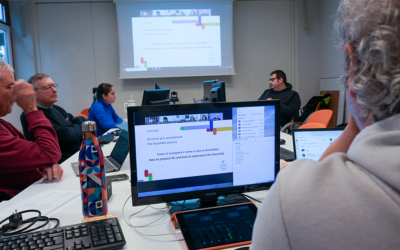Isaiah’s cry of hope was heard by the people of Israel who had been in exile for 50 years in Babylonia (modern Iraq). Finally the Lord sent his messenger to announce their liberation, their freedom to return to their homeland. Just as when they were enslaved in Egypt, God once again revealed himself as their leader who would guide them to the Promised Land. They then had to repair the roads, fill in the holes; remove all the roadblocks, as was customary to do when a king traveled to one of his provinces.
And then five centuries later on the banks of the Jordan River, John the Baptist repeated this joyful cry of the prophet Isaiah. This time, it announced the coming of the Messiah himself.
«Prepare the way of the Lord! Make straight… a highway for our God! »
Every year, as we draw closer to Christmas, we hear this same invitation. In every age God has revealed his ardent desire to remain among his sons and daughters, and now he has “made his dwelling among us” (Jn 1:14). Today too he stands at our door knocking because he would like to come in and “dine” with us (see Rev 3:20).
We ourselves often yearn to meet him, to have him as our traveling companion through life’s journey, and to be filled with his light. In order for him to enter our lives, however, we first need to remove the obstacles. It is no longer a matter of clearing the roads, but of opening up our hearts to him.
Jesus himself named some of the barriers that close off our hearts: “theft, murder, adultery, greed, malice, deceit, licentiousness, envy, blasphemy, arrogance, folly” (Mk 7:21-22). At times it may be anger against our relatives or friends, prejudice toward persons of another race, indifference to our neighbors, a lack of love and caring in our families.
As we face these many obstacles that impede our encounter with God, we hear once again the invitation:
«Prepare the way of the Lord! Make straight… a highway for our God! »
How can we do something concrete to prepare the way of the Lord?
By asking for his forgiveness each time that we have put up a barrier that prevents us from being in communion with him.
This sincere gesture of humility and truth allows us to stand before him as we are, acknowledging our fragility, our mistakes, and our sins.
This is an act of trust by which we accept his fatherly love, which is “merciful… and abounding in kindness” (Ps 103:8).
It expresses our earnest desire to improve and to begin again.
Then at night, before going to sleep, we might stop for a moment to take stock and see how we did and ask for God’s forgiveness.
If we are Catholic, when we gather to celebrate the Eucharist we can be more aware and fervent in the expression of contrition repeated at the beginning of the liturgy. It is the moment when together as a community we ask for forgiveness for our sins.
Then individual confession, the sacrament of God’s forgiveness can be of enormous help. It is a moment of encounter with the Lord when we can hand over to him all our mistakes. We leave confession with the certainty that we have been saved and made new, and we experience the joy that comes from discovering that we are true children of God.
And God himself, through his forgiveness, is the one who removes every obstacle, who “makes straight the highway” and establishes a bond of love with each one of us again.
«Prepare the way of the Lord! Make straight… a highway for our God! »
This is what Louise experienced. She had a troubled life with her friends who were involved in drugs and had morally empty lives. In time, she struggled to break away from this group and she finally made it to overcome her addiction. Still she felt her life was scarred by this experience. After having gone through a hasty civil marriage, she began to recognize the first symptoms of AIDS. At that point, her husband left her.
Louise found herself alone, facing all her mistakes, until one day she met a group of Christians who were living the Word of Life and sharing their experiences. She discovered a whole new world. Soon she came to know God as a Father and as Love. When she began to believe in his forgiveness, she could no longer hold on to her sins. Her life took a complete turn. Knowing that she had been forgiven, now—even in the midst of her suffering and illness—she felt a joy she had never experienced before. Her countenance radiated a beauty that even the progress of the disease could not disfigure. The doctors were surprised to see her so peaceful. She was experiencing a new life.
The day she died, she was dressed in white, as she had asked to be. The road had been cleared for her to reach Heaven, for her encounter with the Lord.
Chiara Lubich




0 Comments